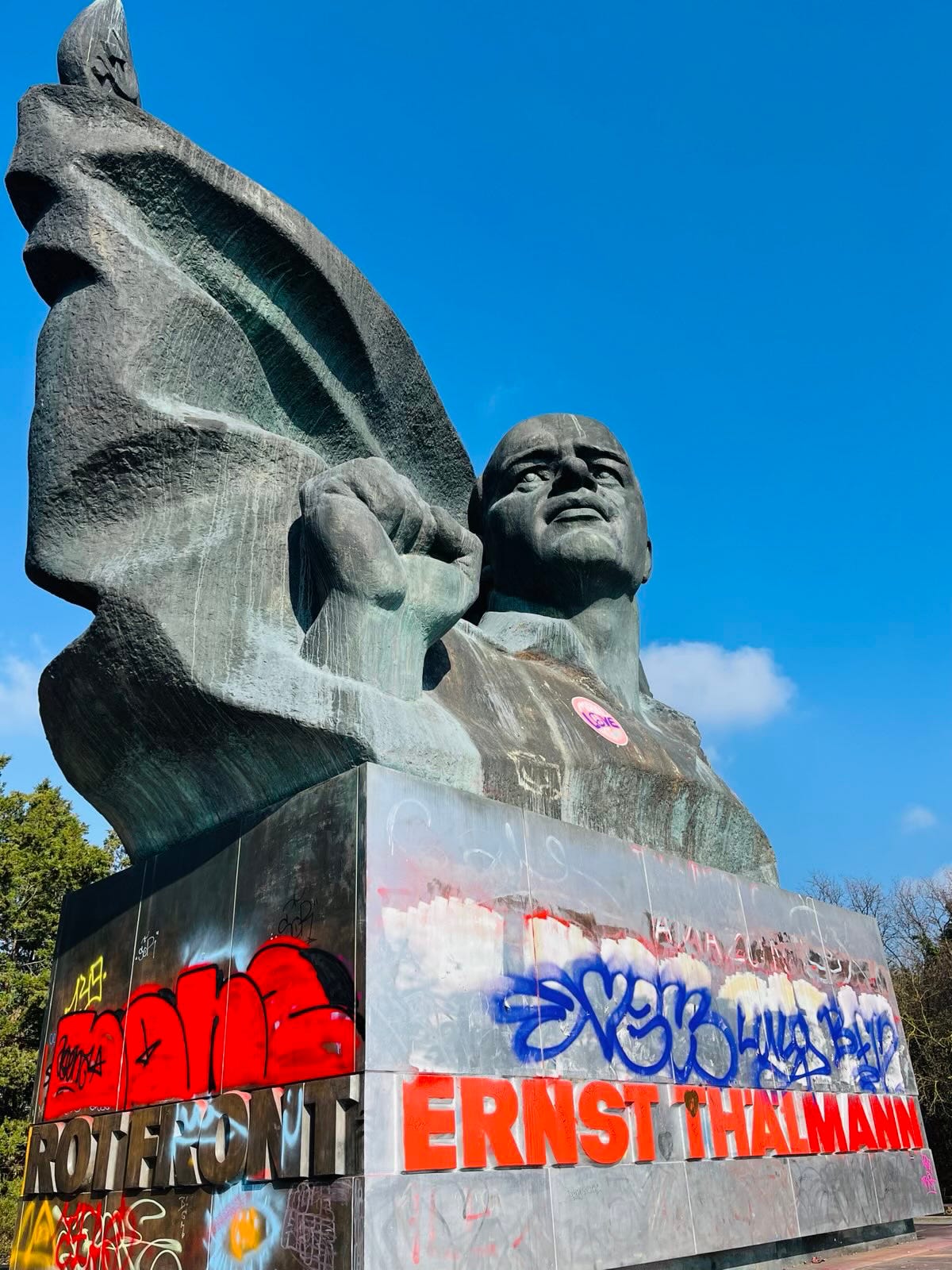The man on my doorstep
#322
My Dear Friend of Democracy,
There's a park very close to my apartment in Berlin's Prenzlauer Berg district that I run through almost every day.
Still, I'd never given much thought to its name until now, even though a gigantic monument honours the park's namesake: Ernst Thälmann.
Thälmann was Stalin's right-hand man in Germany. He fought against the democracy of the Weimar Republic, for example, with the Red Front Fighters' League (Rote Frontkämpferbund), which he led. This Front Fighters' League was the paramilitary organization of the Communist Party of Germany (KPD), in which Thälmann shaped the "Stalinization" of the KPD — the purges within the party that began in the mid-1920s.
Yes, Thälmann was also an enemy of Hitler (Thälmann was arrested in 1933 and died in prison in 1944 without ever having come to trial; more precisely, he was shot on Hitler's direct orders in August 1944, after more than eleven years of solitary confinement). But Thälmann also, and not least, represents the fight against democracy and the attempt to establish a communist regime in Germany.
The GDR leadership, however, had made Thälmann into a hero.
They created a Thälmann cult, which they used to legitimize their existence: Thälmann's resistance against the Nazi regime was interpreted as a working-class struggle for liberation, from which the GDR emerged.
The Thälmann myth permeated the entire oppressed GDR society. Daycare centres and streets were named after Thälmann, there were annual commemorations on his birthday and death anniversaries, and the mass organization for children was called the "Ernst Thälmann Pioneer Organization."
How much research of the and in the public has been done on the person of Ernst Thälmann since the end of the GDR? How many citizens of the former GDR know who the man on the pedestal in the park really was? Is it a good idea that this park, inaugurated by GDR leader Erich Honecker in 1986, still bears that name today?
A friend recently told me how her native South Africa managed to transform the apartheid state into a democracy without the transition giving rise to cruel anger and revenge against the white oppressors. A form of justice had been found without bloodshed, she said. Many white people had publicly acknowledged their bad deeds and repented. This, my friend said, created a societal climate where people could let the past be the past and look forward. And, of course, the integration figure Nelson Mandela was also crucial; he demonstrated that one can forgive even when one has suffered indescribable injustice.
The GDR dictatorship also ended bloodlessly. But it did not lead to a new, jointly created state. The GDR became — at least legally speaking — part of the Federal Republic of Germany. The process of coming to terms with the GDR's history of injustice was carried out according to all-German law and, quite often, with West German judges.
So, the process of coming to terms with the GDR's past was not carried out internally, not within the community of those who brought suffering and those who experienced it.
I suspect that's why the Ernst Thälmann statue still stands in the park and why the park wasn't renamed after the fall of the Wall.
Wherever new things come from outside (and not only bring good things; just think of the high unemployment after 1990), one's history is glossed over. And where the future is uncertain, one looks back, and this look back is meant to provide warmth against the coldness of the present.
However, the problem is that democracy needs justice.
Injustices of the past must be named. And the victims must be allowed to decide what this justice should look like. Otherwise, new injustice will arise from old injustice. And reappraisal is also necessary, to see what things really were like. Reappraisal as enlightenment, so to say. So that mistakes of the past are not repeated in the future. Today’s widespread sympathy for the Russian dictator Putin among the people of the former GDR shows that this has only been partially successful. Actually, it should be the other way around. Support for Putin should be particularly low among former GDR citizens. Because they experienced what it meant to live under the yoke of Russian dictatorship. It is not so. Because many have created a comforting past for themselves. Perhaps they had to.
This is how I explain why the park on my doorstep is still named after an enemy of democracy.
See you in Democracy,
Johannes Eber


